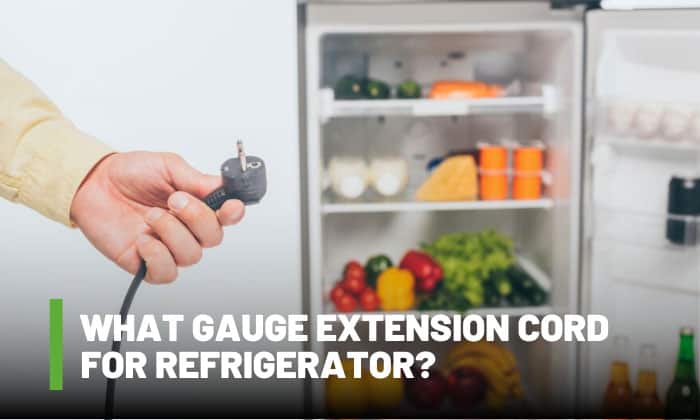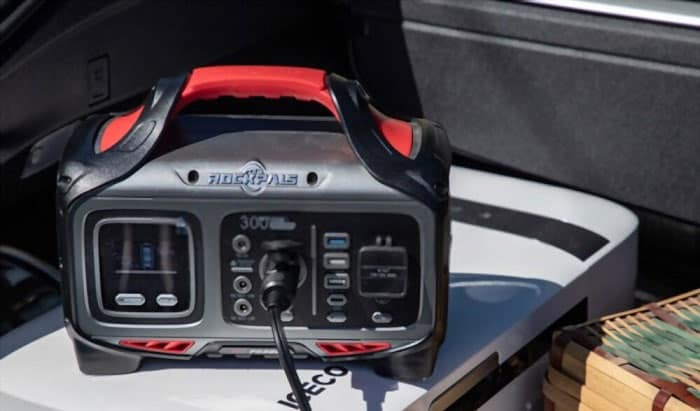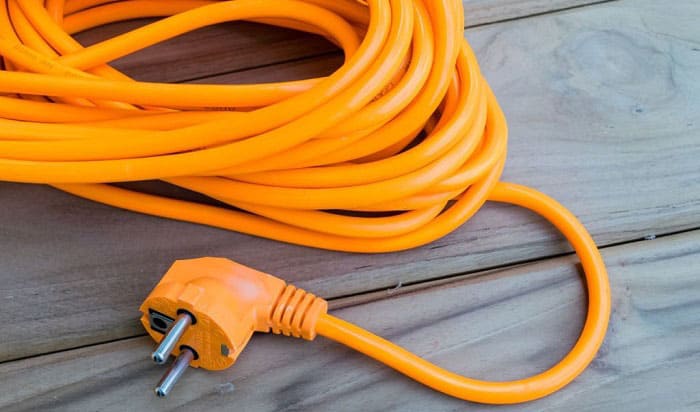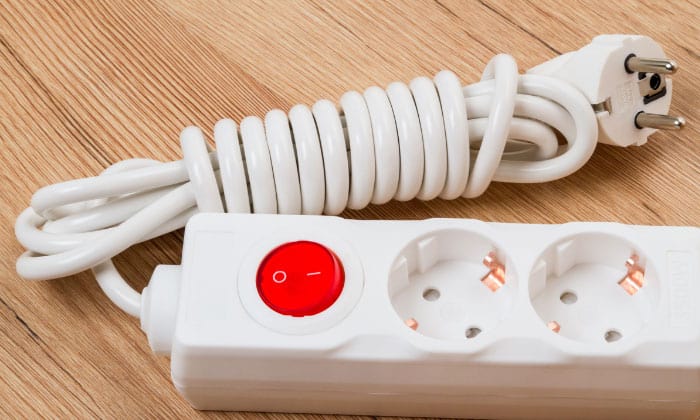You’re trying to plug in your refrigerator, but the outlet is farther than you thought. So now you’re wondering what gauge extension cord you can use.
I recommend a heavy duty extension cord for refrigerator like a 10-gauge variant. It’s also ideal not to use a power strip with lower power capacities than a 12-gauge model.
Take note that there’s more to using a power strip with a refrigerator. So continue reading to learn more what gauge extension cords for refrigerators and other devices.
Table of Contents
What is the Best Extension Cord for Fridge?
Always remember to use the right size extension cord for refrigerator. Failure to pick the correct power strip may result in consequences like overloads, short circuits, and perhaps even house fires.
So it’s best to use extension cords with heavy-duty gauges to supply power to refrigerators. A 10 gauge or 12 gauge variant should suffice for many refrigerators, since these sizes carry 30 and 20 amps, respectively.
Safety Precautions When You Run a Fridge on an Extension Cord
To plug a fridge into an extension cord is generally a straightforward procedure. But doing it without understanding the risks involved may result in catastrophic consequences.
So, here are the things that you should be aware of when you use an appliance extension cord for refrigerator:
- Only use and purchase extension cords with proven certifications (such as UL listings) and ratings.
- Measure the distance from the refrigerator to the outlet before finalizing your purchase. 12 AWG wires, for instance, will only transfer 15A if their length is 100 feet. Within the same distance, 10 AWG cables will handle 20A only. Note that the ratings in the first section apply to runs of 50 feet or shorter.
- Select polarized power strips, or those with three-prong plugs to reduce the risks of harm to the connected appliance in case of a power surge.
- Always pull from the plug and not from the wire if you’re going to disconnect the extension wire from the wall outlet.
- Immediately disconnect the extension cord from the refrigerator if it feels hot.
- Avoid using a power strip if its wire has damage.
Can You Plug a Mini Fridge Into a Power Cord?
Unlike its larger cousin, a mini fridge has a fairly low power requirement. So it’s often safer to use a medium-duty power strip for mini fridge.
In this case, a 14 gauge or 16 gauge power strip should be adequate for a mini fridge. But you shouldn’t use an extension cord that’s lower than a size 16-gauge, or else, an overload may occur.
If you’re unsure, you can check the amperage of the mini fridge first. Usually, this appliance type will need 2 amps only, way below the limit of the cords above. But be careful not to plug in other appliances with high electricity demands into the same power strip.
Frequently Asked Questions
Is It Safe To Plug A Microwave And Fridge Into One Extension Cord?
You should only use either a microwave or a refrigerator with one power strip. Running these two appliances with one extension cord may increase the wear and tear brought to the wire and its connected devices.
Is It Safe To Connect A Refrigerator To Generator?
It’s usually safe to plug a refrigerator into a generator, as long as the power usage is still within the generator’s power capacity. Here are the general steps to prevent problems when using a generator with a refrigerator:
- Check the refrigerator’s wattage requirements.
- Inspect the generator’s maximum wattage; make sure it exceeds your appliance’s demand.
- Ensure that the generator is turned off.
- Place the generator on a flat and safe spot 20 feet from the house.
- Connect the refrigerator to the generator’s outlet.
- Start the refrigerator.
How Do You Determine The Power Rating Of An Extension Cord?
Understanding an extension wire’s power rating typically requires knowing three terms:
- Watts
Watts is a unit measuring the electrical power of any electronic device. The typical home refrigerator uses 350 to 780 watts. That means that a power strip should be able to cater to that power requirement to prevent problems like overloads and short circuits.
- Amps
Amp is a term that’s short for ampere, and it’s a unit of measurement that reads the current generated by conductors. Don’t confuse it with amperage as this particular term defines the measurement of electrical current read in amps.
Simply speaking, electronic devices use amps to measure the speed at which electricity runs through its components, especially through the wires.
Also, take note that amperage changes with the cord gauge. Smaller wires with higher gauges will carry fewer amps.
- Volts
A volt is the standard unit of measurement that defines the electric potential of an electronic device.
After you take note of the values attached to the amps and volts of an extension cord, you can now figure out its power rating.
Oftentimes, you can see this number on the extension cord’s body or packaging. If not, you can calculate that figure by using the following formula:
\begin{equation}
\text{Watts} = \text{Amps} \times \text{Volts}
\end{equation}
What Do The Letters On An Extension Cord Mean?
You can typically find some letters on an extension cord’s jacket. Each letter has a designation, and some of them are:
- S: Okay to use for general purposes.
- W: Ideal for outdoor usage.
- J: Extension cord has insulation rated at 300 volts.
- O: Oil-resistant power cord
- SRDT: Tough cord, typically for devices with high current
How Many Extension Cords Can You Connect Together?
Only use one extension cord to power appliances like home refrigerators. If you can’t reach the nearest wall outlet with your current power strip, don’t connect another extension wire to it.
Extending one extension cord with another power strip will increase the risk of overheating the setup.
Conclusion
At this point, you should now have a better understanding of what gauge extension cord for refrigerator to use. Remember, it’s a wise choice to use a heavy-duty power strip for your fridge.
Also, it’s best not to attempt connecting another appliance to the same extension cord as your refrigerator. Practice proper power strip usage, and the wire and your appliance won’t be at risk of significant harm.

I am Edwin Jones, in charge of designing content for Galvinpower. I aspire to use my experiences in marketing to create reliable and necessary information to help our readers. It has been fun to work with Andrew and apply his incredible knowledge to our content.




